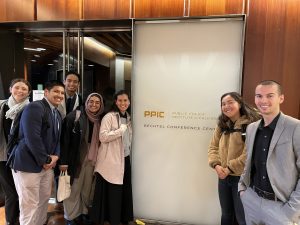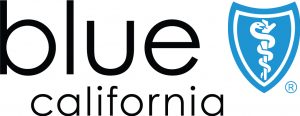Last month, the Coro Fellows in Public Affairs participated in an intensive learning week focused on healthcare. Below, they share their key takeaways.

Who is responsible for the promotion and sustainability of healthy communities?
This was the Coro Fellows’ guiding question during an intensive learning week devoted to the healthcare landscape. At the onset, we recognized that we each held assumptions about the healthcare system – and we embraced a beginner’s mindset. We learned directly from frontline workers, insurance representatives, healthcare providers, policy experts, administrators, innovators, and many more.
We took a deep dive into the roles of cross-sector stakeholders. In addition to learning more about how federal, state, and local governments set, regulate, and administer healthcare, including Medicare and Medicaid, we learned about the complex intersections of nonprofits, labor, and businesses.
We engaged significantly with the social determinants of health – or the sociocultural, political, and economic factors that impact health and exacerbate healthcare inequities among various demographics.
Healthcare imposes a financial burden on many Americans, so of course we studied different payment models, including single-payer, alternative models focused on value-based care, and expanding Medicare to provide universal healthcare. Key learnings:
- California recently expanded access to Medi-Cal, the state’s Medicaid program, to extend coverage to certain populations regardless of immigration status. This was a landmark decision with the potential to set precedent for the rest of the nation.
- The U.S. healthcare system largely operates through therapeutic (reactionary) care, in contrast to preventive care. An innovative method starting to be implemented in our healthcare system is trauma-informed care. This approach seeks to provide more preventative and effective care with a holistic accounting of a patient’s physical, social and mental trauma.
After one week spent learning about the extremely complex healthcare system, we think these ideas merit more exploration and study:
- Many of our interview guests spoke about how the current fee-for-service model incentivizes insurance companies and providers to have patients come in for many different tests and procedures. We heard critiques that this system prioritizes reactionary care over preventative care, and can compromise patients’ well-being. We would like to see a shift to a value-based model of care, particularly one that promotes preventative care through wraparound services that relieve the cost burdens of reactionary care. The Native American Health Center in Oakland is an exemplary model.
- Many of our interviewees spoke of a need for improved communication across healthcare services. One solution might be a centralized healthcare data system that would converge patients’ medical records from their various providers into one easy-to-acccess, multilingual platform. Any changes to the sharing of medical information would need to be Health Insurance Portability and Accountability Act (HIPAA) compliant, a subject for further exploration.
We’re deeply grateful to our Healthcare Focus Week interview guests for generously sharing their time and expertise:
- Erica Murray, MPA, President and CEO, California Association of Public Hospitals
- Shannon McConville, MPP, Senior Research Associate, Public Policy Institute of California
- Amy Lanteigne, MPH, Racial Equity, Reflective Practice, and Trauma Informed Systems Program Manager, Santa Clara County Behavioral Health Services
- Jason Stevenson, MSC, Director of Public Policy, Planned Parenthood of Utah
- Dr. Anthony Iton, Senior Vice President of Healthy Communities, The California Endowment
- Lianne Hope, MPH & MSW, Owner and Founder, Hope Consulting
- Dr. Shonul Jain, Vice-Chief of Pediatrics at Zuckerberg San Francisco General Hospital, Professor of Pediatrics, UCSF
- Greg Garrett, MPH, Chief Operating Officer, Native American Health Center
- Alisha Somji, MPH, Community Health Manager, Kaiser Permanente
- Wanda Cole-Frieman, Senior Vice President, Talent Acquisition, CommonSpirit Health
- Amanda Lasik, Senior Manager, Social Impact, Blue Shield of California
- Oliver Gould, MBA, Director of Channel Partnerships, Lyra Health
- Seciah Aquino, DrPh, Interim Executive Director, Latino Coalition for Healthy California
- Sofi Bergkvist, M.S. & MBA, Executive Director, Center for Care Innovations
Learn more about the Fellows Program in Public Affairs.
Coro Northern California is grateful to our Healthcare Focus Week Partners.

